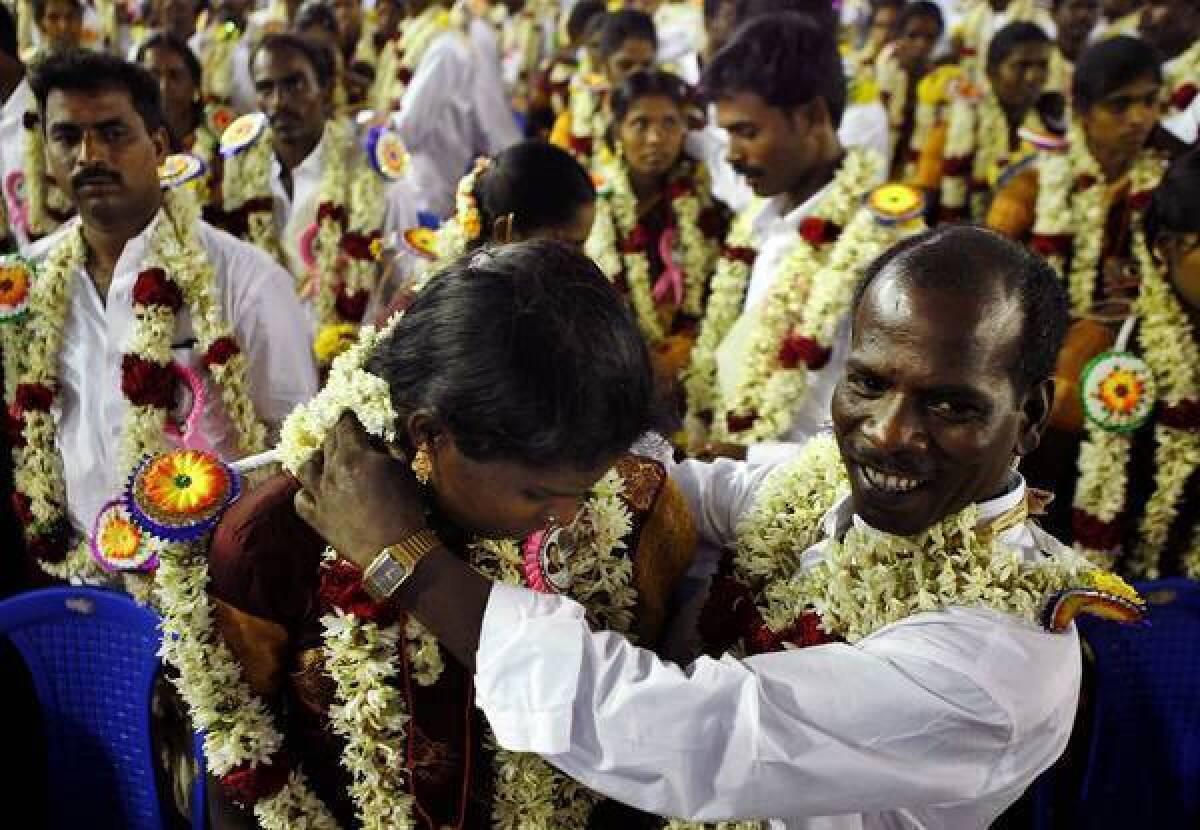In India, first comes detective work, then comes marriage

- Share via
NEW DELHI — It’s a weekday morning in posh Safdarjung Enclave. A man sells fragrant masala tea from a cart, stray dogs dodge belching rickshaws, and two men smoking cigarettes work overtime at looking nonchalant. Their attention is focused on a white house with a narrow veranda and brown trim.
Their studied calm disappears when a twentysomething woman in jeans emerges, jumps into a dented silver Hyundai and sails into the chaotic traffic. The two detectives follow a few cars back. Both are named Raj Kumar, one with a scar on his cheek, the other without.
Their mission: conduct a premarital investigation to assess whether the woman is a suitable match for their client.
Traditionally, premarital snooping in India was done by village priests, matchmakers and busybodies. Is the bride chaste? they asked. Is the groom solvent? Are there any hidden medical problems?
But with urbanization, online social networking and mixed-gender workplaces, more relationships arise spontaneously, beyond the prying eyes in communities that once flushed out shameful secrets and character flaws. Parents often feel ill-equipped to navigate this fast-paced social scene to vet prospective sons- or daughters-in-law. So many are hiring detectives to do the dirty work.
The rush to join an increasingly prosperous middle class has led to a lot of resume-fudging, caste-fudging and salary-fudging, further fueling the demand for background checks.
“In India, you don’t always get what you see,” says Anupam Mittal, founder of Shaadi.com, which bills itself as the world’s largest online matchmaking service. He recommends background checks for couples who meet through his site. “Everyone is like an onion.”
India’s Assn. of Private Detectives and Investigators has 1,200 members, up from 13 in 2005.
Much of the industry’s business involves premarital investigations. Growing demand spurred the recent opening of Kolkata’s Anapol Institute, said to be India’s first private-detective school.
Marriages in India, 90% of which are arranged, are more a merging of clans than a union of two people, and therefore proceed with greater caution. And beneath the nation’s glitzy veneer rests a traditional core. Finding that a woman smokes, drinks an occasional beer with colleagues or frequents nightclubs can put the kibosh on a marriage.
“India’s very orthodox, even though it pretends to be modern,” says Tanmoy Bhattacharya, a software consultant who commissioned a premarital investigation of his niece’s fiance. “With arranged marriages, it’s all very delicate.”
***
On the trail of the woman in the silver Hyundai, the two Globe Detective Agency investigators note that she’s driving a different car than she was the day before. They’re suspicious.
So they won’t be influenced in their investigations, they receive little information about their subjects. But with a few details about the woman’s identity, they’ve managed to download her picture from Facebook. She’s thinner in person than she appears in her Facebook photo, they note.
She’s a fast, decisive driver, complicating their efforts to tail her inconspicuously. Approaching a tollbooth, the detectives are forced to cut off several cars, amid much honking, to stay close.
They’re not too concerned that she’ll notice them. “In India, no one really looks in their rear-view mirror,” says the scarless Kumar.
They snap a cellphone photo for their report. She’s wearing bangles, which are more typically worn by married women, another thing they find a bit odd. Kumar-with-the-scar decides she’s good-looking. “I don’t think I can drive that well,” he adds.
***
Premarital investigations cost $200 to $400 and take seven to 10 days. Detectives follow the subject for 12 to 18 hours daily and chat up co-workers, domestic help and tradesmen under various pretexts. “Beware — your neighbor knows everything,” says Sanjay Singh, chief executive of New Delhi’s Indian Detective Agency. “Sometimes more than you know yourself.”
Particularly useful are fake marketing surveys. Enticed into participating with the promise of a free gift, sometimes something as modest as a bottle of shampoo, the subject or a neighbor may reveal a secret relationship or details of a would-be bride or groom’s late-night entertainment activities and smoking or drinking habits.
“People love freebies,” says Krishna Kumar, an Anapol Institute graduate. “Most fall for it hook, line and sinker.”
She worked at a computer company for four years before deciding detective work would be a lot more challenging. Women have a big advantage as sleuths because they’re non-threatening, can mingle better and are more intuitive, she says.
“I like doing premarital investigations best,” she says. “You’re watching someone go in a new direction, and your work could make or break their future.”
For ferreting out details on employment, finances and family history, cash bribes or bottles of whiskey work wonders, detectives say. Some admit hacking phones and computers and paying bribes to obtain credit card records.
Most premarital investigations are ordered by parents, although sometimes spouses-to-be want a little snooping done, including women keen to size up their prospective mothers-in-law in a society where it is common for couples to live with the husband’s extended family.
According to detectives, investigations turn up significant problems in about 60% of cases. In about 10%, the discoveries are explosive enough — such as previously undisclosed marriages or serious hereditary diseases — to cause cancellation of the wedding.
For the caste-conscious, a hidden Dalit relative, or so-called untouchable, is also problematic. “Caste and dowries remain huge issues today, and people like to exaggerate,” says Sachit Kumar, director of Globe Detective Agency.
A factor driving premarital investigations is the growing number of cases in which foreigners of Indian descent marry and then disappear, often taking huge dowries with them. It happens to 30,000 brides every year in northern Punjab state alone, according to India’s National Commission for Women.
A woman named Priya, 35, hired detectives to investigate three potential husbands she met on matchmaking sites. The first one, it turned out, had lied about almost everything. The second was short-tempered to everyone but his mother, to whom he was slavish.
The third checked out on all counts. He’s now her fiance.
“All told, I’ve spent $2,000 on investigations,” says Priya, who asked to be identified by her first name only for fear of jeopardizing her marriage. “But otherwise I’d be trapped. It was money well spent.”
Some, however, find spying on a future spouse questionable.
“There’s no trust to begin with if you feel compelled to hire a detective,” says Amrita O’Sullivan, 28, who works in an advertising agency in Gurgaon. “It’s a complete intrusion.”
***
After 30 minutes on the highway, the young woman in the silver Hyundai arrives at a suburban house, greets a man in a striped shirt and heads to the balcony for a cigarette.
“We suspect it’s her boyfriend,” scarless Kumar says over the whine of a power saw at a construction site. The detectives drive past the house, but they think the pair suspects something — further evidence of guilt, they say — so they retreat out of sight near the cul-de-sac’s exit.
“I think he’s a manager at her company,” says Kumar-with-the-scar. “You develop a sixth sense.”
The hours pass. It’s over 100 degrees. A dog plunks down in the shade as the detectives listen to Bollywood tunes on a cellphone. Many people think private investigators are all about thrills, they say, but more often it’s endless waiting.
There are minor compensations.
“Her eyes are beautiful,” says Kumar-with-the-scar, looking at the woman’s picture again. “It’s always more interesting if they’re beautiful. And in this business, beauty fuels temptation. Beauty has many takers.”
Tanvi Sharma of The Times’ New Delhi bureau contributed to this report.
More to Read
Sign up for Essential California
The most important California stories and recommendations in your inbox every morning.
You may occasionally receive promotional content from the Los Angeles Times.












